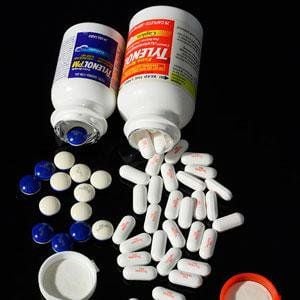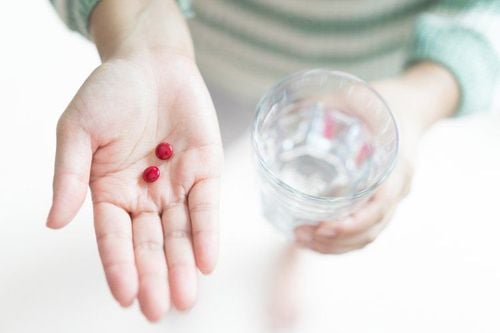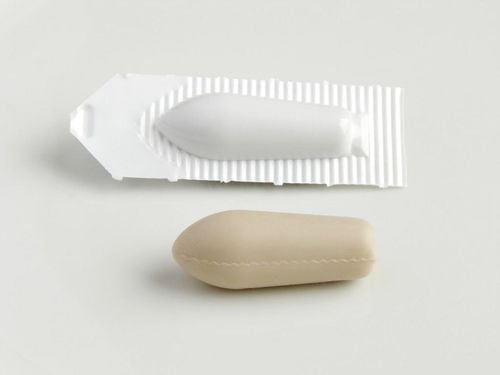1. What is Dolo Neurobion?
What is Dolo Neurobion? Dolo Neurobion contains the following ingredients: 50mg Diclofenac + 50 mg Pyridoxine (vitamin B6) + 50mg Thiamine (vitamin B1) + 1mg vitamin B12. The B vitamins in the drug act as coenzymes, creating substances necessary for metabolism. They play a role in the metabolism of central and peripheral nerve cells, maintaining the structure and function of the nervous system. At the same time, B vitamins also have a synergistic effect when combined with the antagonism of pain receptors of Diclofenac in mixed pain.
Vitamins B1, B6 and B12 are important for the metabolism of the nervous system. The combination of these B vitamins promotes the regeneration of damaged nerve fibers, leading to enhanced recovery of function and neuromuscular innervation. The combination of B vitamins and Diclofenac has been used since 1962 to treat pain with a combination of nociceptive and neuropathic pain. Studies have demonstrated a significant synergistic effect between the above B vitamins and the analgesic effect of Diclofenac.
Indications for using Dolo Neurobion:
- Treatment of joint pain, rheumatism;
- Treatment of pain related to neuritis, neuralgia;
- Treatment of post-traumatic and post-operative pain;
- Treatment of acute pain in otolaryngology, obstetrics and gynecology and maxillofacial surgery.
Contraindications for using Dolo Neurobion:
- People who are hypersensitive to the active ingredients and excipients of the drug;
- Patients with a history of bronchospasm, rhinitis, asthma, urticaria after treatment with non-steroidal anti-inflammatory drugs;
- People with acute gastric - duodenal ulcers or gastrointestinal bleeding, with a history of these diseases;
- Patients with acute cerebral hemorrhage or other severe bleeding;
- Patients with severe renal failure with creatinine clearance below 30ml/min;
- Patients with severe liver failure with ALT/AST levels higher than 30 times the upper limit of normal;
- Patients with established congestive heart failure (grade II - IV), peripheral arterial disease, severe ischemic heart disease, severe cerebrovascular disease;
- Pregnant women;
- Children under 12 years of age (due to high Diclofenac content).
2. Usage and dosage of Dolo Neurobion
Usage: Oral. Patients should swallow the Dolo Neurobion tablet whole without chewing with a glass of water, preferably after eating.
Dosage:
- Adults: Take 1 tablet/time x 3 times/day. The maximum recommended dose is 3 tablets/day;
- Elderly: No need to adjust the dose;
- Overweight people: No need to adjust the dose;
- Patients with mild to moderate renal or hepatic impairment: No need to adjust the dose;
- Children under 12 years of age: Contraindicated.
The duration of treatment for acute mixed pain is 3 - 10 days. It is recommended to treat for as short a time as possible. Patients with persistent or chronic mixed pain may be treated for a longer period of time depending on the doctor's assessment.
Overdose: There have been no reports of overdose with thiamine or vitamin B12. If high doses of pyridoxine are used for a long time, the patient may experience sensory neuropathy and syndromes of sensory neuropathy. These symptoms will gradually improve when treatment is stopped and can then recover completely.
In case of acute Diclofenac poisoning in patients taking Dolo Neurobion, symptomatic and supportive treatment should be given. Treatment measures applied are gastric lavage and activated charcoal. Supportive methods should be used to avoid the risk of renal failure, hypotension, convulsions, respiratory depression and gastrointestinal stimulation. At the same time, it is necessary to actively monitor the patient for timely treatment.
Missed dose: If you forget to take a dose of Dolo Neurobion, you should take it as soon as possible. If the time of discovery is close to the time of the next dose, skip the missed dose and take the next dose as planned.
3. Side effects of Dolo Neurobion
When using Dolo Neurobion, patients may experience some side effects such as:
- Uncommon: Gingivitis, stomatitis, acute exacerbation of ulcerative colitis or Crohn's disease, glossitis, esophageal lesions, constipation;
- Rare: Hypersensitivity reactions (edema, anaphylactic reactions, hypotension), insomnia, disorientation, mental stimulation, visual disturbances, memory disturbances, sensitivity disorders, paresthesia, tinnitus, gastrointestinal ulcers, gastrointestinal bleeding, gastrointestinal perforation, taste disturbances, hematuria, acute renal failure, proteinuria;
- Very rare: Leukopenia, thrombocytopenia, agranulocytosis, aplastic anemia, hemolytic anemia, vesicular rash, eczema, Stevens-Johnson syndrome, erythema multiforme, exfoliative dermatitis, toxic epidermal necrolysis, alopecia, purpura, photosensitivity reactions;
- Unknown frequency: Hypersensitivity reactions (tachycardia, sweating, itching, hives), confusion, dizziness, headache, fatigue, fluid retention, hypertension, edema, stroke, myocardial infarction (especially in people using Diclofenac at high doses above 100 mg/day for a long time), abdominal pain, nausea, vomiting, indigestion, flatulence, diarrhea, anorexia, ischemic colitis, liver cell damage, increased liver enzyme levels (ALT, AST), hepatitis, chromuria (slightly red urine, appearing within the first 8 hours after taking the drug, usually resolving within 48 hours).
When experiencing side effects of Dolo Neurobion, patients should stop taking the drug and immediately notify the doctor or go to the nearest hospital for timely diagnosis and treatment.
4. Precautions for Dolo Neurobion users:
Some notes that patients need to remember before and during using Dolo Neurobion:
- During treatment with Diclofenac, patients may experience ulcers, bleeding, and perforation of the stomach and intestines without warning signs. This risk may increase in the elderly, those taking higher doses or for longer periods of time. Be especially careful when using Dolo Neurobion at the same time as drugs that increase the risk of ulcers or bleeding such as corticosteroids, anticoagulants;
- In people with cardiovascular disease, Diclofenac can lead to fluid retention or edema. When treated with Diclofenac, especially at doses above 100mg/day and long-term, it may be associated with an increased risk of arterial thrombosis (myocardial infarction, stroke). Special monitoring is recommended in patients with cardiovascular risk factors (hyperlipidemia, diabetes, smoking, hypertension), Dolo Neurobion should only be used after careful consideration;
- In patients with dehydration, the Diclofenac component increases the risk of nephrotoxicity. Therefore, dehydration should be avoided in patients being treated with Dolo Neurobion. Special caution is recommended in patients with mild or moderate renal impairment;
- Caution should be exercised when using Dolo Neurobion in patients with mild or moderate hepatic impairment;
- Serious skin reactions may occur, especially at the beginning of treatment with Dolo Neurobion. Therefore, Diclofenac should only be used in patients with acute intermittent porphyria or systemic lupus erythematosus after careful consideration of the benefits and risks;
- Long-term use (6 - 12 months) of pyridoxine at moderate doses may lead to a risk of neuropathy. Therefore, the patient's health should be monitored regularly when using the drug for a long time; Dolo Neurobion contains lactose, so it is not recommended for use in patients with galactose intolerance or glucose malabsorption.
- Dolo Neurobion contains lactose and is not recommended for use in patients with galactose intolerance, glucose-galactose malabsorption or lapp lactase deficiency;
- Side effects such as dizziness, fatigue and visual disturbances may occur after taking Dolo Neurobion. Therefore, if affected, the patient should not drive or operate machinery;
- Using Diclofenac can reduce fertility in women, so it is not recommended for women who are planning to become pregnant, have difficulty conceiving or are being tested for infertility;
- Diclofenac can cause embryopathy, so Dolo Neurobion should not be used in pregnant women;
- Dolo Neurobion should only be used in breastfeeding women if treatment is necessary, has been considered and permitted by a doctor.
5. Drug interactions of Dolo Neurobion
Some drug interactions of Dolo Neurobion include:
- The effect of L-dopa may be reduced when used concurrently with pyridoxine;
- Pyridoxine antagonists such as cycloserine, penicillamine, isoniazid, hydralazine may reduce the effectiveness of pyridoxine;
- Long-term use of loop diuretics (such as furosemide) may accelerate the excretion rate, reducing thiamine concentrations;
- Using Dolo Neurobion concurrently with glucocorticoids, other non-steroidal anti-inflammatory drugs, serotonin reuptake inhibitors or platelet aggregation inhibitors, etc. may increase the risk of ulcers, gastrointestinal bleeding;
- Diclofenac may increase the effectiveness of platelet aggregation inhibitors, anticoagulants (such as warfarin);
- Diclofenac can increase the concentration of phenytoin, lithium, digoxin, potassium-sparing diuretics or methotrexate,... in the serum;
- Diclofenac can increase the toxicity of cyclosporin on the kidneys;
- Diclofenac can reduce the effectiveness of antihypertensive drugs or diuretics;
- Drugs containing probenecid or sulfinpyrazone can lead to prolonged excretion of Diclofenac.
During the use of Dolo Neurobion, patients need to strictly follow all instructions and prescriptions of the doctor. Patients should not arbitrarily change the dosage of the drug (increase or decrease the dose) without permission to avoid adverse events to health, even life.
Follow the website of Vinmec International General Hospital to learn more information about health, nutrition, and beauty to protect the health of yourself and your loved ones in the family.
Please dial HOTLINE for more information or register for an appointment HERE. Download MyVinmec app to make appointments faster and to manage your bookings easily.













